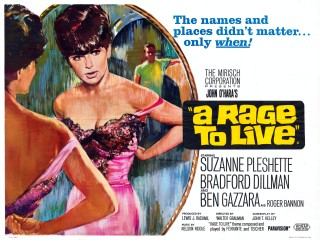
A RAGE TO LIVE
US, 1965, 101 minutes. Black and white.
Suzanne Pleshette, Bradford Dillman, Ben Gazzara, Peter Graves, Bethel Leslie, Lyndon Chiles, James Gregory, Ruth White, Mark Goddard.
Directed by Walter Grauman.
A Rage to Live is based on a novel by John O’ Hara, very popular in the 1940s and 1950s, the type of novel that is more commonplace in later decades but was considered frank and even risque in those times. Other films were made of his novels including Ten North Frederick with Gary Cooper.
The film has a strong theme, the psychology and behaviour of a nymphomaniac. Suzanne Pleshette is very good in the central role. Leading men of the time including Bradford Dillman and Ben Gazzara played her husband and her lover.
The film is frank, emerging as it did from the mid-60s when there were challenges to the Hayes Code and a greater sense of freedom in presentation. However, the treatment might still seem rather restrained from the perspective of later decades.
The film won an Oscar nomination for set design for a black and white film.
The film raises significant moral issues. Commentators note that it is easy for a film to portray a male and promiscuity but not so easy when a woman is in the central role. The film raises issues of the differences between the sexes as well as similarities. The film also raises a number of moral issues about dealing with the problem of nymphomania and dealing compassionately with the person.
1.A film of 1965? Based on a popular novel? The issues and treatment?
2.The black and white photography, the local settings, the town, the countryside? The musical score and the themes?
3.The title, the poem and the quotation?
4.The 1960s, a slice of life? The issues of sexuality in those times? Changing times? Changing treatments in Hollywood movies? The use of melodrama to explore moral issues?
5.Suzanne Pleshette’s performance as Grace? The portrait of Grace, as a woman, of her times? Her problems and her nymphomania? The psychological attitudes, emotional? The effect on her and her estimation of herself? Her being at home, her quiet life, with her mother? Her skills at her work, a professional woman? Charlie, the rape and the issues of sexuality? The other men? The lies? Her going on the holiday and its effect, her relationships, moving out? The explanations? Brock, Sidney? The proposal, her wanting to tell Sidney the truth, her being ashamed about herself? His acceptance of her, the marriage? The peaceful two years, her delight in having the baby? Roger and his approach, the affair? The effect on Sidney? Her trying to cover? Slipping out with other men, her reputation? Jack and the tennis, the affair? The death and the revelation? Sidney and his turning against her? The separation? Jack’s wife and her telling Sidney about the affair? The personal consequences, the social consequences, the exposure? What was Grace left with at the end? In her estimation of herself, her behaviour, her reputation? Sidney and the child? Her mother? The condemnation? The audience being asked to be compassionate?
6.Roger, his personality, the son? The engineer, looking at Grace? Work, his approach, promises to her, the affair? The end of the affair? His condemnation of her? Death?
7.The contrast with Sidney, as a person, the hopes, a gentleman? The mother’s death? His learning the truth, accepting it? The wedding? The happy years of marriage, the child? His knowing the truth? His dismay over the years, Jack’s wife and her revealing what had happened? His action?
8.The portrait of Grace’s mother, Grace supporting her, her mother being anxious about her daughter?
9.Brock, the help, the regrets?
10.Jack, the personality, the tennis, the affair? Jack’s wife and her motivation in speaking to Sidney?
11.Charlie, his relationship with his mother? A coward? Fighting Sidney?
12.The social context for these moral problems? Public opinion? Gossip? Condemnation?
13.The moral issues, understanding of sexuality, aberrations? The psychological illness? The compassionate treatment of a person in such a moral dilemma?